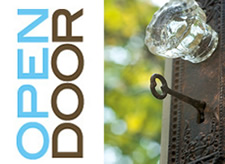Download FormsTherapeutic assessment and treatment of juveniles with sexual behavior problems requires specialized skill and licensing on the part of treatment providers. At OpenDoor, this is our only business and we commit to provide help to families based on our years of experience, training and knowledge of current research.
We will work closely with the juvenile and caregivers to provide the best possible care to the family during this period of crisis and confusion. Our goal is to help the juvenile learn effective ways of managing appropriate behavior and the family repair, rebuild and move forward to a life of health and success.
The professionals at OpenDoor are skilled to work with adolescents who struggle with a variety of intellectual and developmental issues. They understand that each person comes with his or her own special concerns and problems and are able to develop a plan that will best serve that individual and the family.
What to Expect
At some point in time the adolescent will undergo a round of tests or assessments to determine special concerns related to the sexual behavior exhibited, if treatment is appropriate and the level of treatment needed. Assessments might be required by your attorney prior to adjudication in order to help make decisions on the case and the treatment provider will require any testing not previously administered to be able to make sound treatment decisions. All tests listed below are available through OpenDoor.
Treatment can begin before or after conviction, but all requirements will remain the same. The juvenile and caregivers will begin the process with the juvenile attending individual sessions then moved to group sessions when appropriate. He or she will attend sessions no less than four (4) times per month. Parents will begin the Parent Support group at the same time but will attend twice monthly. Length of treatment depends on juvenile’s progress and any requirements of probation (if applicable) along with the extent to which the parents and/or caregivers make changes recommended. As juvenile and caregivers progress, they might become eligible for aftercare and allowed to come on a less frequent basis. In order to remain in treatment, attendance and timely payment are mandatory. Polygraphs might be ordered if individual does not admit to offense, and are required upon completion of sexual history presentation, and within at least the first year of treatment and prior to completing treatment.
Therapy
The primary model of treatment used is Cognitive Behavioral Therapy.
Treatment of individuals with sexual behavioral problems will take into account Risk,
Need
The need principal states that an individual’s dynamic risk factors
- Antisocial personality pattern (impulsivity, adventure or pleasure-seeking, restless aggression, irritability)
- Pro-criminal attitudes, (rationalizations for crime and negative attitudes toward the law, social supports for crime (i.e. criminal friends and isolation from positive social influencers)
- Substance Abuse
- Negative family and marital relationships
- Poor school and/or work performance and a low level of satisfaction
- Lack of involvement in positive social recreational or leisure activities
should be assessed and become the focus of treatment.
and Responsivity
combined with taking into account each individual’s life goals and helping that person find ways in which to meet those goals safely – Good Lives Model (GLM).
Psychosexual Evaluations
[qa cat=adolescent-evaluations]Abel Assessments
[qa cat=adult-abel]Risk Assessments
There are presently no empirically validated actuarial instruments that can be used to accurately estimate the risk of adolescent sexual reoffending. Based on the best available research to date and consensus in professional clinical opinion, however, a number of high-risk factors have been identified in the current available literature. However, data from the instruments below can be used to summarize the available research, along with an expert clinical opinion to estimate the risk of sexual re-offense of a particular adolescent.
[qa cat=adolescent-assessments]*Although the above evaluative tools are relatively standard, other testing instruments might be recommended on a case-by-case basis.
Chaperone Training
When an adolescent commits a sexual offense, certain restrictions must be put in place immediately to prevent further inappropriate sexual behavior and protect that individual from any additional allegations. The juvenile will need to be directly supervised by an approved adult at all times and measures must be in place for the times that cannot occur (i.e. when the adult is sleeping). It is important that any adult responsible for supervising the child fully understands those restrictions and the extent and dynamics of the offense/sexual behavior. It is also important that a chaperone be willing to hold the client accountable for inappropriate behavior and communicate closely with other members of the team. All chaperones are required to attend this one-time three (3) hour training and be approved by other members of the team to meet this requirement. An approved chaperone is also required to attend parent support group on at least a quarterly basis.
(Note: Team includes treatment provider(s) and probation officer or referral source if applicable.)
